Reimagining Maintenance & Reliability

21 October 2025 Millennium Point, Birmingham


21 October 2025 Millennium Point, Birmingham
After three decades of transforming maintenance & reliability practices across Australia, NZ, and the US – the MAINSTREAM Community is bringing its expertise to Birmingham.
From Data-driven decision making, Decarbonisation and Digital Twin – to Artificial Intelligence, Automation and Asset Performance Management – MAINSTREAM is not your average conference.
Known for its forward-thinking and willingness to tackle brave topics, MAINSTREAM offers: 40 case studies & sessions; 5 specialised learning tracks; 5 workshops; hands-on tutorials; expo showcasing 25 partners; year-round membership to the MAINSTREAM Community online network; and access to all content post-conference.
Join us for an amazing day of learning, networking, and knowledge-sharing. From factory floors to power stations, MAINSTREAM is here to supercharge your assets – and celebrate the people, technology, and ideas transforming Maintenance & Reliability.



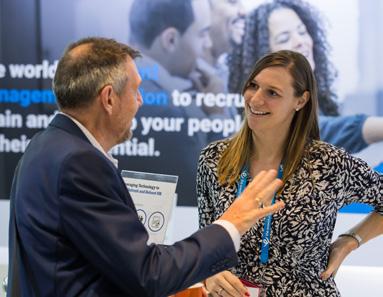



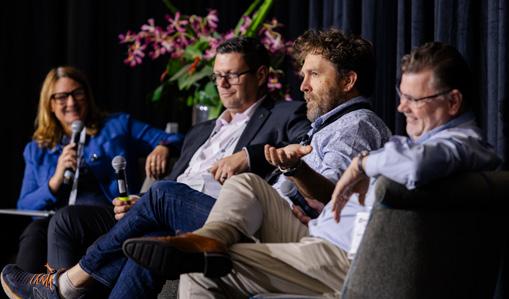






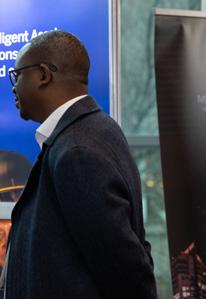







“ MAINSTREAM is the best Asset Management and Reliability Conference in the world.”
Drew Troyer
Contributing Editor, Reliable (US)

“ If there is one event you can attend this year, to meet industry experts from around the world and explore effective asset maintenance, then MAINSTREAM would be my pick.”
Janvi Shah Head of Highways Asset Management (UK), Arcadis

Kieran Dodds
Head of Operational Engineering, National Highways

Jamie McGowan
Maintenance & Reliability Manager, Future Biogas

Sven Brown
Asset Care & High Voltage Services Business Lead, Severn Trent

Maciej Janowski
Head of Reliability and Machine Safety, GA Pet Food Partners

James Ayre
Asset Management Director, MAG Manchester Airport Group

Ruth Rollings
Maintenance Engineering Manager, AETC Ltd – Precision Machining Facility

Phil White
Chief Maintenance Officer –Maintenance Services, United Utilities

Adam Spencer
Maintenance & Asset Care Lead, Heineken Group B.V.

Gary Tyne Director, Pro-Reliability Solutions

Ben Botwright Engineering Manager, Kerry

John Campbell
Global Maintenance Excellence Manager, Convatec

Ashley Morris
Industrial Asset Manager, Airbus

Jo Gillard
Engineering Excellence Lead, Finsbury Foods

Vicki Orman Vice President, Harsco Environmental

Laura Trevarthen Director – Global Manufacturing Reliability, Cytiva

Jamie Hughes Plant Manager, Ecolab

Jonathan Peedell Head of Maintenance, Bentley Motors

Richard Jeffers Owner, Two6 Services

David Stephens Chief Engineer, Premier Foods

Adam Lea-Bischinger
Senior Consultant
Asset Management, AR Consulting

Dr Neil Arthur
Lead Maintenance Strategy Engineer, Lloyd’s Register

Luke Oates
Reliability Engineer, DP World

Richard Barber Maintenance Systems Lead Engineer, Drax Power Station
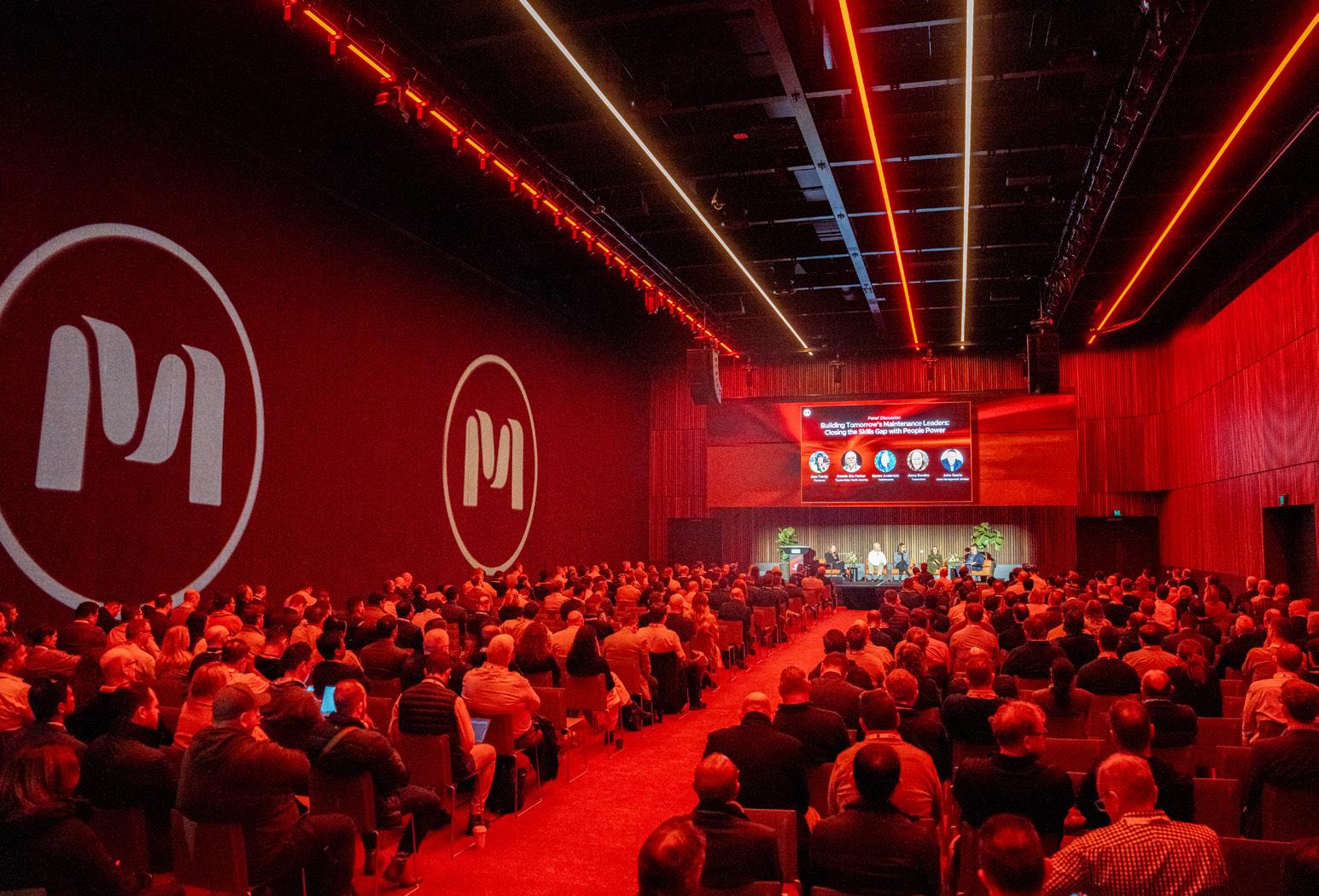
Monday
20/10 21/10
17:00 – 18:30
• Speaker Briefing
18:30 – 19:45
• Pre-Registration
• MAINSTREAM JumpStart
• Networking drinks in the Millennium Point Thinktank Science Museum sponsored by One River
Tuesday
O7:15 – 08:00
• Registration, Networking & Expo
08:00 – 17:00
• Summit Opening
• Vision Stage
• Asset Stage
• Reliability Stage
• Maintenance Stage
• Technology Stage
• Innovation Theatres
17:00 – 18:30
• Networking Drinks sponsored by Naviam

Curated Content Across 5 Tracks
Access to all Keynotes, Breakouts and Demos
Lunch, Morning & Afternoon Teas
Networking Functions
Mobile App
Year-round membership to MAINSTREAM Community Online Platform
Searchable Attendee List
Access to all Content After the Event
MAINSTREAM offers you FIVE different formats for learning, capability development, interactivity, and knowledge.
Strategic discussion on industryshaping challenges. Thought-provoking sessions that tackle broad issues.
4
Panellists from different companies and industries collide with varied viewpoints and diverse perspectives and experiences.
Practitioners share their perspectives and battle-tested approaches to business challenges, revealing triumphs, lessons learned, and tangible results.
Capability development and deep learning the 60 minute workshops are delivered by content experts.
Rapid-fire demonstrations, new solutions, showcasing the latest apps, products, and technologies poised to transform asset, equipment, and workforce management.
This keynote frames reliability in financial terms – highlighting how a well-executed reliability management strategy influences profit, return on net assets (RONA) and share price. You will see the difference between the industry leaders and laggards and learn how to close the gaps to turn the potential benefits into real profit. This is not a maintenance seminar. Rather, we take a cross functional look at reliability management and link it to key financial performance indicators.
• Relate plant reliability to profit, return on net assets (RONA), share price and other key financial performance indicators.
• Se e the cross-functional nature of process reliability management – it is not all about maintenance.
• Move beyond thinking in terms Overall Equipment Effectiveness (OEE) to Overall Business Effectiveness (OBE) to manage reliability across the entire value stream.
• Delve into the human factors of failure, including psychological and social psychological drivers.
• Design for reliability, maintainability, operability, and flexibility the genetic code of the manufacturing process.
• Operate for reliability, including supply chain management and customer/SKU rationalisation.
• Maintain for reliability.
• Deploy a comprehensive and lasting reliability management strategy that drives value for your shareholders.

Discover critical strategies for building high-reliability, high-performance teams in mission-critical operations. This masterclass, led by NASA Flight Director Ed Van Cise, provides a unique exploration of leadership principles developed through decades of international space station management.
• O perations philosophies for balancing safety and mission success.
• H ow anticipating potential failures prevents catastrophic outcomes.
• High reliability and high performing organisations.
• Why purposeful focus on people and culture is important.
• H ow to empower leadership at all levels.
• Focusing on what could go wrong helps ensure things go right.
Drawing from real-world NASA experiences, Ed offers Maintenance and Reliability leaders actionable strategies for creating resilient, adaptive organisational cultures.
Ed Van Cise has worked in human spaceflight operations with the International Space Station since 1998. His experiences include not only direct command and control of the space station but also instruction of astronauts and flight controllers, as well as management of groups that perform that work. In 2009, Ed was selected as the 78th NASA Flight Director and took on the call sign “Carbon Flight.”

Climeworks is inventing and deploying direct air capture (DAC) technology to permanently remove carbon dioxide from the air, reversing the effects of global warming. We have the unique challenge of being both the OEM of frontier technology, and the owner-operator of the plant. We face the challenge of designing our DAC units for high reliability, which is critical for high uptime and low carbon removal costs, enabling a path to profitability. At the same time, we must define maintenance practices for firstof-a-kind technology while operating the plant through the harsh environmental conditions of Iceland.
• What is direct air capture and how it works
• How to overcome the challenges of designing and deploying first-of-a-kind technology
• How to build a maintenance & reliability team to service nascent technology in remote locations
• Influencing R&D and equipment design to deliver a safe and reliable product
• Convincing the executive team to see high availability as a value, not a cost

Maintenance and operations working together to drive outstanding results in manufacturing is a challenge.
By focusing on the fundamentals of manufacturing and listening to your frontline workers, reliability can be increased dramatically while lowering your costs at the same time. We are surrounded by many technology advancements, but having a strong foundation is a must to enable the new technology solutions of the future. A fundamental approach to dramatically improve manufacturing performance by focusing on the basics.
• Focus on the 5 foundations of manufacturing: Centerlines, CILs, PMs, Master Cleaning Schedule, & 5S
• Operations and Maintenance Working Together
• Listening to your associates (frontline workers) – they will tell you the answers
• Continuously improve the fundamentals

This landmark gathering marks the beginning of a new tradition, bringing together leaders, innovators, and practitioners to share knowledge, spark new ideas, and shape the future of reliability and maintenance.
To open this historic event, our keynote speaker—widely recognized as the Godfather of Reliability—will set the stage with insights that connect timeless fundamentals to today’s challenges. While technology is evolving faster than ever, the core principles of maintenance remain unchanged since the days of Rome’s aqueducts: success depends on the right people doing the right things within well-defined and consistently applied processes. We’ll focus on how technology is the enabler that helps us execute these basics better than ever before. This keynote will celebrate the value of these principles and inspire new ways of applying them in modern contexts.

Admired by industrial companies and business schools the world over, the Toyota Production System (TPS) is revered as an organisational culture as much as it is a plant operating system. It’s core philosophy — to motivate and develop people so that they can surface and solve problems quickly and build a culture of continuous improvement — extends beyond the company’s own walls to include its suppliers.
When Toyota’s North American Manufacturing centres were not achieving equipment reliability goals consistently, Ed Welch was appointed to lead the NA Engineering and Maintenance organisation.
A five-year maintenance ‘Hoshin’ (what, why, how) was established, and activities were aligned with specific targets for improvement around Safety, Quality, Productivity, Human Morale, and Cost.
• Relationship between Toyota Production System and Total Productive Maintenance.
• Respect for People.
• Get ting back to basics.
• 12 principal attributes of Total Productive Maintenance.
• TPM implementation methods.
• Using the knowledge base of all the employees to improve equipment reliability.
• Open communication between operators and engineering.
• Training production personnel to perform routine maintenance.
• Assuring a culture of sustained Continuous Improvement (PDCA).
Edward Welch retired from a distinguished 26-year career at Toyota Motor Manufacturing North America where he led Maintenance Best Practice Initiatives for 16 Vehicle Assembly Plants, 3 Powertrain Machining Plants, and 4 Casting Plants. He was the TPM Lead for Maintenance Member Skill Development; Production Member TPM training; and he led the North America Maintenance Self Reliance Team.

Anthony Veder operates a fleet of gas tankers, each functioning as a fully operational site. This creates a unique challenge: how to structure, align, and utilize data from multiple vessels to improve reliability, avoid recurring issues, and drive cost-efficient maintenance.
In this session, Esther van der Voort (Reliability Manager, Anthony Veder) and Pieter van Camp (CCO, I-care Group) share how the company is working to connect operational data across its fleet, enabling better insight, collaboration, and learning across teams. A key focus is on internal communication and the cultural change required to ensure that insights are shared and acted upon throughout the organization.
This session invites maintenance professionals to gain practical insights. It offers valuable takeaways on how to make better use of existing data, foster alignment across teams, and approach maintenance challenges from both a technical and organizational perspective.
• Introduction to Anthony Veder
• Current status of the Predictive maintenance program
• Challenges within this program
• The f uture…

This presentation explores how we bridged the gap between cutting-edge predictive maintenance technology and the people needed to make it work. Using best practice frameworks coupled with internal knowledge of our assets, we aligned strategy across asset management, operations, and maintenance teams. By building grassroots skills in-house and with supply chain support, we transformed data overload into prioritised, actionable alerts. The result? A shift from reactive to proactive maintenance, where teams now respond to predictive insights and see asset care as a value driver—not just a cost. Attendees will leave with practical strategies to align people, process, and technology for lasting reliability success.
Ross McCorrisken has over 12 years of experience in asset management within the water industry. Beginning his career as an apprentice Ross is currently a Technical Team Manager at Scottish Water. He leads a team responsible for developing asset health, criticality, and reliability for the organisation. His leadership has been instrumental in enhancing operational resilience and efficiency through a program of service risk improvements which have improved outcomes for customers.

The industrial landscape is witnessing a paradigm shift in how organisations approach maintenance and reliability. What was once viewed as a necessary cost centre is now recognised as a strategic competitive advantage.
Phil presentation delves into the challenging but rewarding journey of transforming an organisation’s maintenance approach through a structured excellence program. By documenting our experiences, setbacks, and breakthroughs, we provide a roadmap for others embarking on similar transformations, proving that the most difficult step is often the first one taken.
• Fou ndation Assessment: Conduct a brutally honest evaluation of current maintenance practices, capabilities, and organizational readiness
• St rategic Road mapping: Develop a comprehensive transformation plan with clear milestones and targeted communications to build organizational momentum
• Resilient Implementation: Navigate the non-linear path to excellence by anticipating challenges and building organizational resilience
• Cu ltural Transformation: Establish a universal reliability language that transcends departmental silos
• Kn owledge Acceleration: Systematically elevate organizational capabilities through targeted training and knowledge sharing
• Au thentic Leadership: Deliver improvements with unwavering integrity while celebrating wins and transparently addressing setbacks

Prioritising maintenance work is crucial in an environment where resources, time, and budget are limited. We must continuously adapt our approach to the ever-changing operational landscape to answer critical questions such as:
• Which assets are the most critical to our operations?
• Which lower-criticality equipment can have their maintenance deferred or moved to run-to-failure (RTF) strategies without increasing risk?
• How does the failure of a single piece of equipment impact the overall system?
At Woodside, the traditional A/B/C equipment classification system proved insufficient for managing the risk of failure across our global fleet of over half a million assets. This method lacked the precision to prioritise truly critical equipment and assess potential risks to both people and the plant.
Here how we developed and implemented a dynamic, data-driven Equipment Criticality Analysis (ECA) program. This new approach evaluates equipment based on 14 key parameters, assigning a score out of 100 to quantify its criticality. What sets this ECA apart is its live, dynamic nature—integrating with realtime data sources to automatically adjust criticality scores as operational conditions change. For example, if a piece of redundant equipment fails, the criticality of its backup automatically increases.

Over the past four years, Luke has led the successful yet ongoing implementation of the Global Reliability Program at DPW Southampton, transforming their maintenance culture and capabilities.
This session will explore how they have moved from a culture where maintenance was largely reactive, with limited awareness or application of proactive and predictive strategies to the present day where maintenance decisions are informed by condition monitoring technologies and data analytics.
Key initiatives to be discussed include:
• Root Cause Analysis (RCA) driven by failure codes from the CMMS
• Precision alignment techniques
• Oil sampling and analysis
• Thermographic inspections
• Ultrasound technology integration
• Implementation of a Lubrication Excellence Program
Luke began his career at DP World in 2008/9 as an Engineering Apprentice, progressing through various roles within the department while earning an Engineering degree. Currently pursuing a Master’s in Senior Leadership, he now leads the Global Reliability Program at DP World Southampton – utilising a team of in house developed specialist’s technicians to help improve engineering performance through Reliability focused aspects, such as predictive technology, data analytics and RCA facilitation, while also advising other European terminals on the DPW Reliability Program, best practices, knowledge sharing and auditing.

In an era where technological solutions dominate discussions about maintenance improvement, the most powerful catalyst for transformation often remains overlooked: human potential.
Jo challenges the conventional wisdom that better maintenance outcomes stem primarily from advanced tools and techniques. Through her experience at Finsbury Foods, she’ll demonstrate how a deliberate focus on people-first principles can dramatically accelerate maintenance excellence while simultaneously enhancing team engagement, capability, and satisfaction. The findings reveal how cultural transformation serves as the foundation upon which all technical improvements can be sustainably built.
• Cult ural Foundations: Understand why organizational culture serves as the primary determinant of maintenance performance outcomes
• Hum an-Centered Transformation: Discover the methodical approach we implemented to place people at the centre of our maintenance strategy
• Tru st Architecture: Learn the specific actions that broke down historical barriers and fostered unprecedented collaboration
• Fro ntline Impact: Examine a compelling case study showing measurable improvements in both technical outcomes and human experience
• Imp lementation Roadmap: Walk away with a concrete, actionable framework for initiating your own people-first maintenance revolution

The convergence of artificial intelligence and industrial maintenance represents perhaps the greatest opportunity for operational transformation in decades. Yet many organizations remain paralysed by perceived complexity, cost barriers, and implementation challenges.
Jonathan dismantles these misconceptions through the lens of Bentley’s recent AI implementation journey. By focusing on practical applications rather than theoretical possibilities, we demonstrate how organizations of any size can leverage AI capabilities to dramatically enhance maintenance effectiveness without massive investment or specialized expertise.
• Real-World Applications: Examine compelling examples of AI implementation at Bentley that delivered immediate and measurable value
• AI Demystified: Cut through the technical jargon to understand the core AI variants most applicable to maintenance and reliability
• Co mmunication Blueprint: Master the critical messaging required to gain organizational buy-in and support for AI initiatives
• Problem-First Approach: Learn why defining the right problem precedes selecting the right technology
• Mo del Development: Understand the essential steps for training effective AI models within your specific operational environment
• Expectation Management: Set realistic timelines and outcomes for early adoption periods based on our experience
• Impl ementation Case Studies: Study tangible examples of AI predictability systems delivering bottomline results

Modern asset-intensive organisations find themselves drowning in data while thirsting for insight. The proliferation of data collection technologies – from enterprise systems to IoT sensors – has created unprecedented information volume without necessarily improving decision quality.
This session explores the critical barriers preventing organizations from realizing the strategic value of their asset data and presents a systematic approach to transforming fragmented information into actionable intelligence. Through real-world case studies, we demonstrate how leading organisations are converting their data liability into a strategic asset that drives competitive advantage.
• Con textual Intelligence: Bridge the critical gap between raw data collection and meaningful operational context
• Systems Integration: Dismantle organizational and technological silos that prevent holistic asset understanding
• Capa bility Development: Build the essential human capabilities required to extract meaning from increasingly complex data environments
• Lifecycle Management: Implement governance frameworks that maintain data integrity throughout the asset information lifecycle
• Strategic Transformation: Convert data from a maintenance burden into a driver of strategic business value and operational excellence

In an era where every pound invested must demonstrate clear business value, UK maintenance and reliability leaders face a critical challenge: translating technical expertise into strategic business language that secures executive buy-in and adequate funding. This panel explores the fundamental disconnect between asset management practices and enterprise objectives, examining why traditional approaches to maintenance budgeting often fail to resonate with senior leadership.
The complexity of demonstrating maintenance value extends far beyond simple cost-per-repair metrics. Modern organisations require sophisticated risk-based frameworks that articulate how asset reliability directly impacts revenue protection, operational resilience, and competitive advantage. Yet many maintenance professionals struggle to quantify these contributions in terms that align with boardroom priorities and shareholder expectations.
Drawing from real-world experiences across diverse UK industries, this discussion addresses the persistent funding challenges that prevent maintenance excellence. We examine how competing organisational priorities, combined with communication barriers between technical and executive teams, create systematic underinvestment in asset reliability.
• Developing risk-based budget justification frameworks
• Creating meaningful KPIs that resonate with executive stakeholders
• Establishing governance structures that embed asset reliability considerations into strategic planning processes

This presentation showcases Reliability Centred Maintenance (RCM) studies conducted by BioMarin Pharmaceuticals International Ltd.
In this session Audrey will focus on key activities including FMECA modeling, RAM development, and strategy optimisation. The studies led to improved maintenance strategies, reduced downtime, and enhanced system reliability. Discussion will also look at how BioMarin took a collaborative approach and how using digital reliability modelling tools like Availability Workbench have provided deep insights.

This session will focus on the opportunities with digitization for asset management from a practical perspective and how it impacts maintenance and operations teams’ daily routines. We’ll demonstrate concrete benefits, such as eliminating the need for physical notebooks, morning print-outs, or manual work-order closures. We’ll showcase specific, fact-based case studies, like the implementation of maintenance technology. This data-driven approach, centered on tangible outcomes and successful precedents, will resonate with an audience eager to hear how others in the industry are advancing in maintenance and operations.
• Benefits: What can digitalization bring
• Requirements: Where do you stand and what does it take
• Implementation & Change: How to implement & engage your workforce
• Demo: Practical showcases of some of the (newest) digital developments
• Future: How is digital (mobile) maintenance market developing

South Western Railway needed an Asset Management System deployed 5-6 months that was functional and fully integrated to several key business systems. Having achieved this with HxGN EAM and NTT DATA Business Solutions, they have taken the solution forward to unlock business value and increase profitability through continuous improvement, integrations and self-sufficiency. Learn how South Western Railway achieves asset excellence through technology and partnership, with both Hexagon and NTT DATA Business Solutions, in an industry where asset reliability is paramount. Understand how the journey will continue for this ambitious company, using a market leading solution.
•Introducing South Western Railway
•Rapid HxGN EAM Deployment to Meet Contractual Obligation
•The Continuous Improvement Journey
•Using Integrations to increase value and profitability
•Future Aspirations using the HxGN EAM Platform
•Increasing Using Engagement and System Useability
•Partnership Approach with NTT DATA Business Solutions


Every business eventually needs to modernise its maintenance processes to drive efficiency and resilience.
Like many organisations, Tate & Lyle was running a successful operation but was constrained by data silos, outdated processes, and aging technology.
This presentation will share Tate & Lyle’s digitalisation journey—covering the early considerations, the transition from fragmented systems to an integrated solution, the measurable gains achieved, and the lessons learned along the way.
Key topics include:
• A review of legacy systems and processes
• The challenges of managing maintenance with SAP
• Implementing Prometheus solutions and integrating with SAP
• Productivity gains, process improvements, and business impact
• Lessons learned and next steps in the digitalisation journey

This presentation covers the challenges faced by OEM wind power service providers in achieving continuous performance optimisations. The critical role of data interpretation and the enhancement of data quality in meeting asset management requirements will be emphasised. Additionally, the implementation of asset strategy management software will be covered, highlighting its potential to improve asset performance. Through showcasing real-world examples, it will be demonstrated how leveraging software leads to more effective decision-making and optimised operational efficiency.
• Change management in wind power asset management
• Challenges and value of data in asset management
• Asset strategy integrated into IT infrastructure
• Examples of asset performance improvements

MonitoringīЅAЅChangeЅManagementЅ
JourneyЅatЅHeidelbergЅMaterialsЅUK

This case study explores how Heidelberg Materials partnered with AVT Reliability, and their Machine Sentry platform, to standardise and implement a unified reliability and condition monitoring programme across multiple plants.
The initiative centred on creating a single source of truth for asset health, aligning data structures with SAP, and embedding a sustainable change management approach.
By consolidating platforms, standardising practices, and engaging teams from production and maintenance, the programme delivered maximum visibility, CAPEX efficiency, and long-term sustainability.
Early challenges included structuring databases, ensuring ownership, and training teams from zero to competent, through strong leadership, clear guidance, and a voice-of-the-customer approach, the project achieved lasting impact.
Reliability Centred Maintenance (RCM) is a proven framework for building robust maintenance strategies, but traditional studies are often slow, resource intensive, and difficult to scale. This session demonstrates how Generative AI can transform the way RCM studies are developed, dramatically reducing cycle time while maintaining analytical rigour.
Using real world examples, we will show how GenAI tools can:
• Rapidly generate functions, functional failures, and failure modes from asset data, manuals, and CMMS history.
• Suggest initial maintenance strategies aligned to RCM principles.
• Streamline documentation and report generation, producing structured RCM tables and visual outputs for stakeholder review.
We will also address the practicalities of adoption—from data readiness and validation workflows to integrating human expertise and ensuring quality outcomes. Attendees will leave with a clear roadmap for piloting GenAI in their own RCM programs, cutting development time from weeks to days without compromising reliability or safety.

Industry 4.0 and AI technologies are cool, but today, more than 50% of asset-intensive companies are still more than 50% reactive when maintaining their production assets.
As stated in the Mainstream’s State of Asset Management 2024 report: “Before any new tech or continuous improvement programs are even considered, good work management fundamentals need understanding and adherence.”
This workshop focuses on the fundamental elements required to implement a sustainable planned work culture to get the expected value from your asset maintenance investment in the Industry/AI 4.0 Era.
• Asset data and reliability strategy
• IPSPEC Planned maintenance work execution cycle
• Implementing an effective multi-week scheduling process using Industry 4.0 technologies with a dedicated focus on minimizing equipment failure risks
• Resolving the ‘Everything is Urgent’ production syndrome and having Maintenance and Operations work as a single team with the common goal of maximizing production output
• Implementing a change management and long-term sustainment program to provide permanent value
• Measuring and sustaining the value across the organisation

While emerging technologies like AI, digitalization, and smart sensors promise to revolutionize maintenance practices, organisations must first establish robust reliability fundamentals.
Without a strong foundation in basic maintenance processes, preventive maintenance compliance, and reliability-centered strategies, new technologies may actually distract from critical improvement areas.
The key indicators of technological readiness include consistent execution of planned maintenance work, established reliability metrics, standardized maintenance procedures, and trained maintenance personnel working within well-defined processes.
Remember: reliable assets and effective maintenance practices are driven by people executing work through proven processes – technology simply enables and enhances these fundamentals.
Christer, known as the Godfather of Reliability, is the brains behind IDCON INC, a global authority on Reliability and Maintenance. His journey started in the Swedish merchant marine, where he laid the foundation for his Results-Oriented Reliability and Maintenance Management concept. Over the last five decades, he’s worn many hats—mechanic, engineer, manager, consultant, educator, philosopher, reliability guru, and company leader.


Despite collecting massive amounts of operational data, organisations often struggle to extract meaningful insights or translate this information into financial returns. This presentation unveils a proven framework that transforms raw data into verified value - converting untapped information assets into tangible pounds.
I’ll demonstrate how to progress systematically from data collection to actionable insights, informed decision-making, and targeted interventions that deliver measurable financial impact. By ensuring data integrity, leveraging predictive analytics, and implementing precision maintenance strategies, your organisation can pivot from reactive fire fighting to proactive asset optimisation.
This methodology does not just improve asset reliability - it creates a comprehensive value chain that reduces costs, enhances safety, improves sustainability metrics, and protects organisational reputation through evidence-based decision-making that drives both immediate profitability and long-term business resilience.
• Building the data-to-pounds value chain
• Ensuring data integrity for confident decision-making
• Leveraging predictive analytics for early intervention
• Implementing precision maintenance strategies
• Shif ting from reactive to proactive asset management
• Measuring and verifying financial returns from data initiatives
Critical Takeaways:
• Systematic approach to transform data collection into verified financial value.
• Methods to align data strategy with business objectives for measurable returns.
• Prac tical techniques to embed data-driven decision making throughout the organisation.

This interactive, standards-aligned workshop provides a practical pathway to design and implement a futureproof Asset Management System (AMS). We begin with the current context: Industry 5.0 (human-centric, sustainable, resilient value creation), European demographic shifts and their implications for competence and knowledge retention, the ISO 55000:2024 series update, and the Maintenance Landscape Model that systematically embeds maintenance within Asset Management. Participants will translate these principles into a coherent AMS architecture—governance, processes, roles, information, and digital line-of-sight from strategy to execution—ready for assurance and continuous improvement.
Participants will explore:
• How the human-centric, sustainable, and resilient perspective of Industry 5.0 transforms AMS design and implementation
• Ways to bridge strategy and execution using horizontal and vertical digital line-of-sight
• How digital readiness and Artificial Intelligence can enhance decision-making and performance assurance
• The relevance of integrating maintenance into asset management through the Maintenance Landscape Model
• How updated practices and frameworks support the next generation of Asset Management
• The session combines short conceptual inputs, real-life examples, and facilitated discussion to stimulate active learning and reflection.

As asset-intensive organisations adopt increasingly sophisticated technologies-from ERP and APM systems to IoT sensors, drones, and mobile inspection tools—they face a growing challenge: data overload. While the capacity to collect information has grown exponentially, the ability to convert this data into actionable insights remains elusive. According to recent studies, 78% of organisations gather more maintenance and reliability data than they can analyse, and only 23% consistently turn that data into business value.
This panel will explore how organisations can overcome the barriers of fragmented systems, poor data quality, and limited analytical capability to unlock the strategic potential of their asset data. Key challenges such as contextual intelligence gaps, system silos, skills shortages, and information lifecycle mismanagement will be discussed, along sidereal-world examples of how leading orgaisations are tackling them.
Panellists will share proven strategies including implementing robust data governance, integrating contextual data with asset performance metrics, and building cross-functional teams that blend maintenance expertise with data science.
Attendees will gain practical guidance on building a data-to-decision pipeline, improving data literacy across teams, and selecting technology platforms that support long-term asset intelligence. This session will equip maintenance and reliability leaders with the knowledge to transform data from a burden into a strategic asset.




AI is transforming asset management, but are we truly pushing its boundaries? This discussion explores the real-world applications of AI in the asset management, beyond the well-worn paths of predictive analytics and digital twins. We’ll explore how organisations are leveraging AI for decision-making, insight generation, and knowledge retention, and ask what’s next.
Is AI becoming a true partner in asset lifecycle management, or are we stuck in pilot purgatory? We’ll dissect what’s working, what’s hype, and where the frontier of AI in asset management is heading next.



One of the greatest challenges to achieving maintenance and reliability excellence in the UK is the persistent misalignment between asset management strategies and wider organisational objectives. This disconnect often prevents businesses from realising the full value of their asset investments. While leaders are increasingly asked to demonstrate how maintenance and reliability activities contribute to business outcomes, articulating this value is complex: there is no simple linear relationship, and definitions of “value” vary across organisations depending on strategic priorities.
This 45-minute panel debate will explore the root causes of this misalignment and the implications it has for decision-making and long-term competitiveness. Key questions will include: What drives the disconnect between technical and business strategies? How should value be defined and measured across financial, operational, and sustainability dimensions? What role should Maintenance and Reliability leaders play in translating technical performance into business impact? And how can asset strategies be made adaptable to shifting corporate priorities?
Through diverse perspectives, the panel will challenge assumptions, share practical examples, and debate actionable steps to ensure asset strategies directly support business goals. Participants will leave with insights into both the pitfalls of misalignment and the pathways to creating stronger, value-focused connections between asset and company strategies.
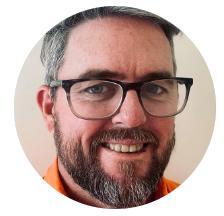


As asset-intensive industries face accelerating retirements, evolving career expectations, and fast-paced technological change, the workforce landscape is undergoing major disruption. This session addresses the dual challenge of attracting talent and preserving knowledge to maintain operational performance in a volatile environment.
With critical shortages already reported in maintenance and reliability roles, organisations are losing vital expertise faster than it can be replaced, especially in regional areas where recruitment is toughest.
We’ll examine this "perfect storm" of pressures: retiring experts, growing digital demands, and a new generation with different learning styles and motivations. Research shows 37% of technical knowledge remains undocumented, and younger workers are over three times more likely to leave when knowledge isn’t shared. The session will share proven strategies, including cross-generational mentoring, digital knowledge tools, flexible roles, and partnerships with educators. We’ll explore how top organisations are reducing time-to-competency and reshaping maintenance careers to attract next-gen talent.




The current landscape demands that Maintenance and Reliability leaders possess a unique blend of technical, analytical, and interpersonal skills. This panel discussion will highlight the critical role of people and competencies in shaping effective M&R leadership. By focusing on the development and integration of these competencies, M&R leaders can drive operational excellence, enhance safety, and ensure sustainable practices within their organizations. Operational Efficiency Through Competenceimplementing effective maintenance strategies such as preventive, predictive, and corrective maintenance. This session will explore how advanced technical skills and data-driven decision-making improve maintenance processes and operational efficiency. Leadership and Team Development – our people are at the heart of maintenance and reliability success. How can excel in building and leading high-performing teams, build strong communication, conflict resolution, and mentoring skills. This session will delve into strategies for developing these crucial leadership skills. People and competencies are the cornerstone of effective Maintenance and Reliability leadership. This panel will provide insights from industry experts on how to cultivate these competencies, offering practical advice and best practices for current and aspiring leaders.




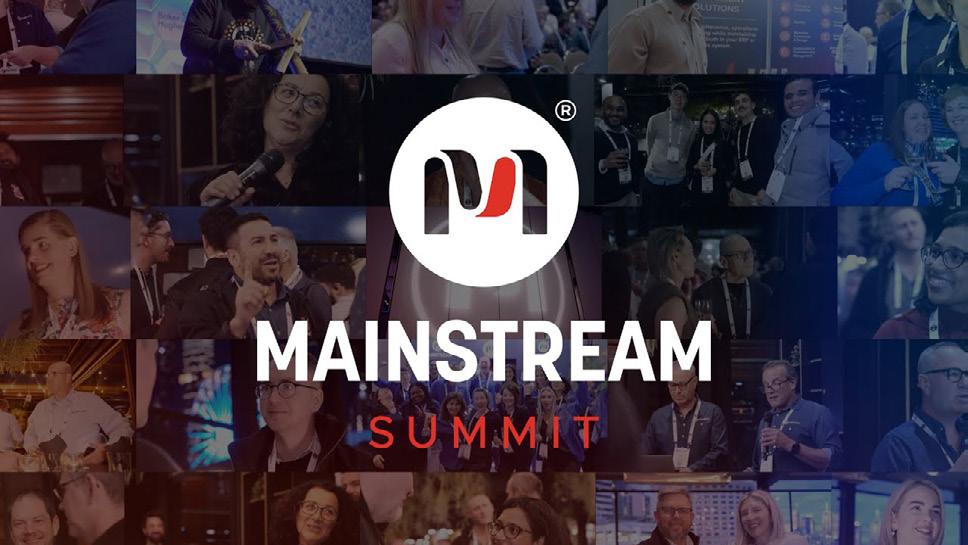














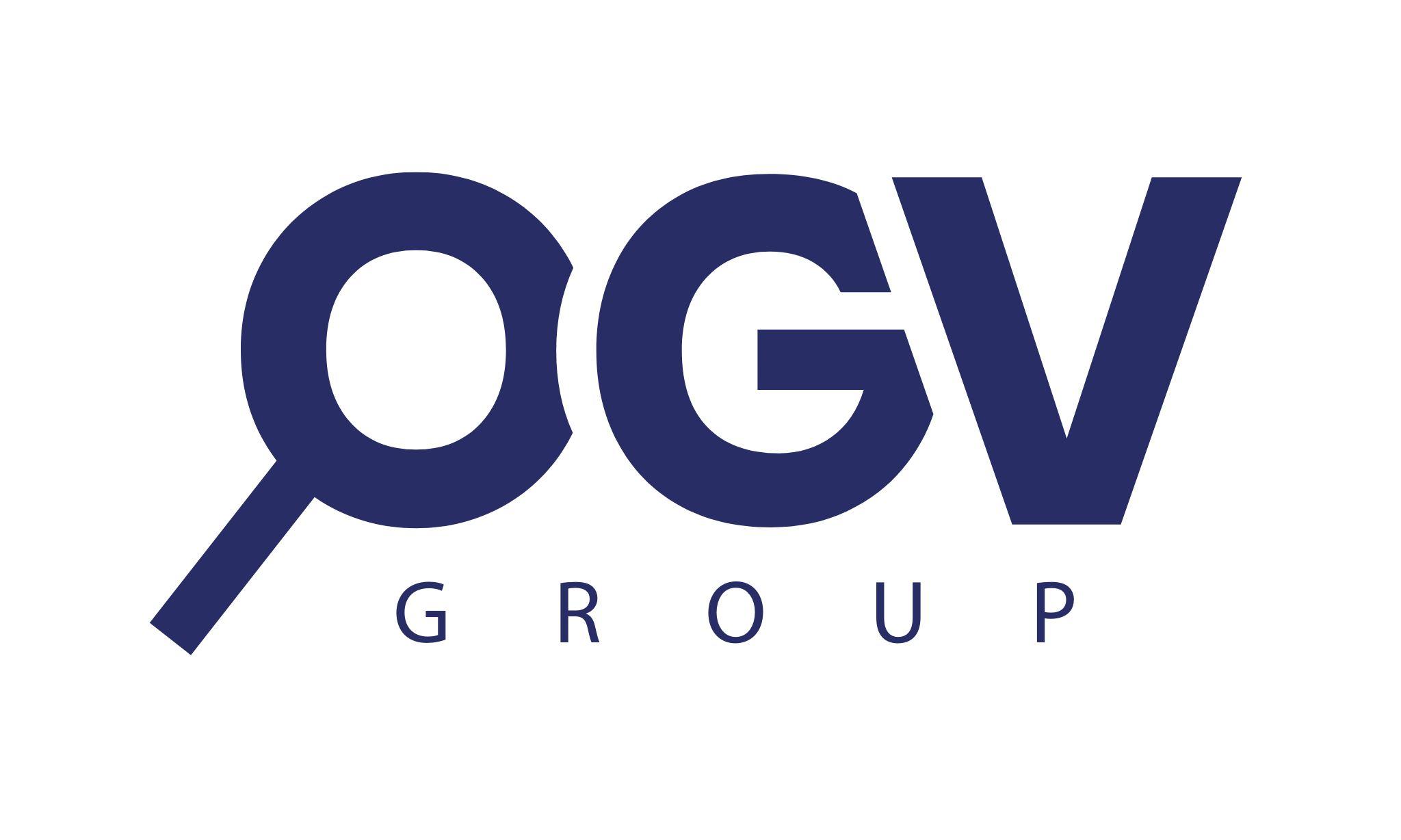













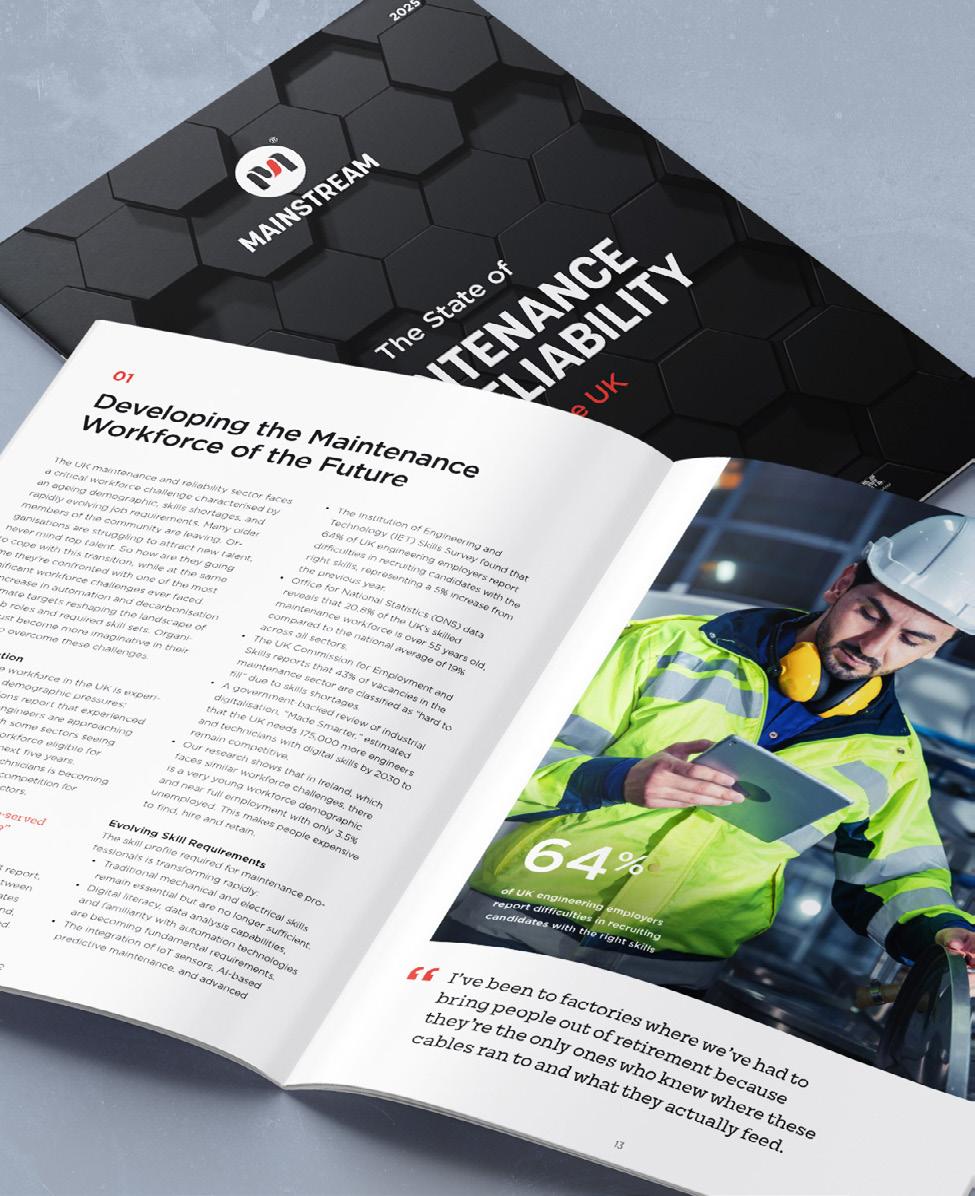
Download your sentiment report exploring the immediate and relatable challenges, opportunities, and uncertainties confronting Maintenance and Reliability Leaders and their teams.
Go to:
www.mainstreamcommunity.com/uk-summit/topics

Program Director
+44 7901 150 405
ian@mainstreamcommunity.com

Meike Paternotte
Community Engagement Manager
+44 7874 439 451
meike@mainstreamcommunity.com

Partnerships and Operations Manager
bree@mainstreamcommunity.com

Community
ansumi.debruin@mainstreamcommunity.com



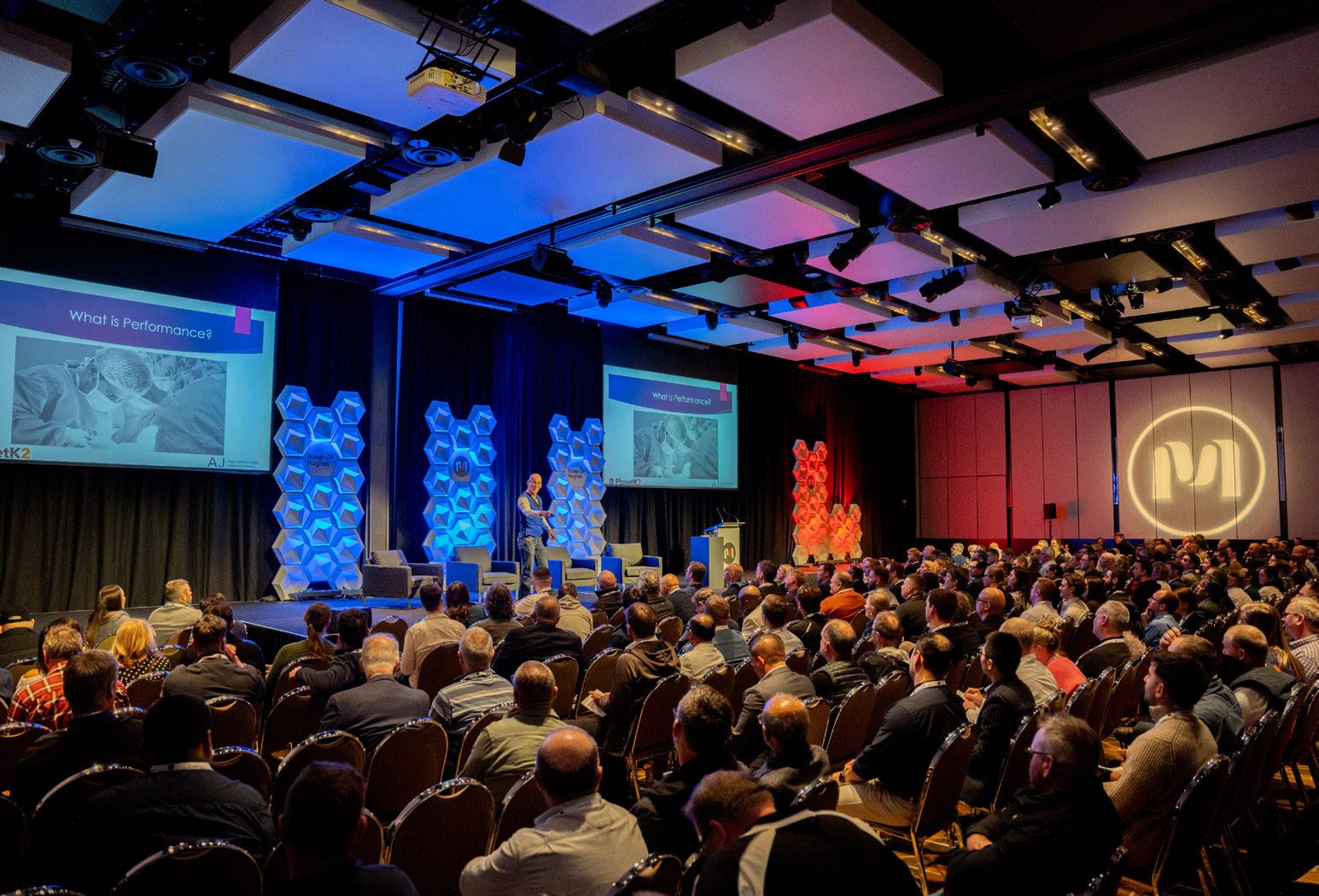
See you there!
www.mainstreamcommunity.com/uk-summit/home